Myth #6 Eat less, exercise more, and you will lose weight.
Myth #7: People who carry fat are always unhealthy
Myth #8: People who are skinny are always healthy
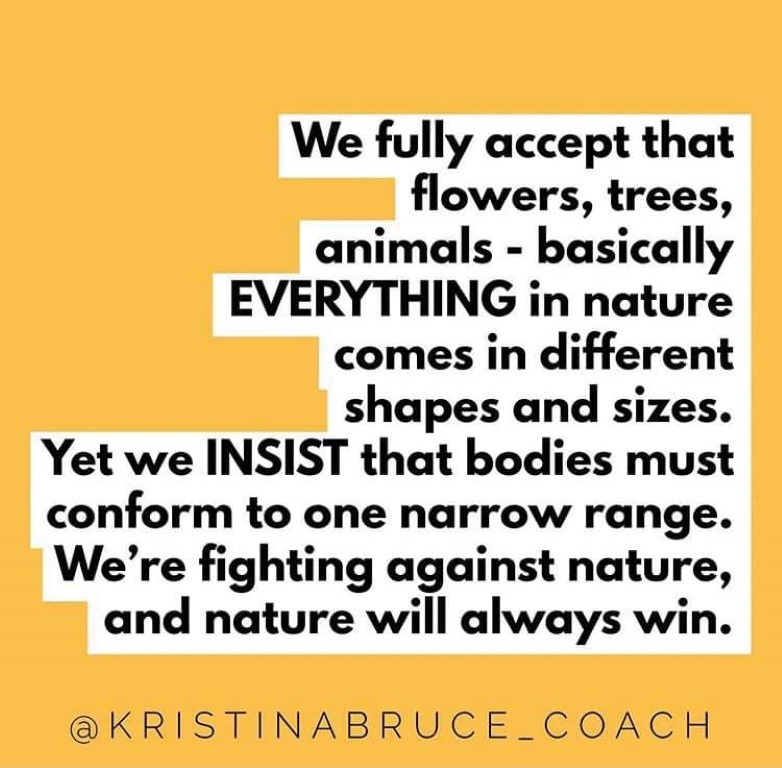
“Now for question 3, have a discussion with the people at your table group. Would you prefer to be fat and fit, or skinny and sickly?” Mrs Franklin’s Y9 health classes were nightmarish, and she wanted to be there even less than we did.
“Well, obviously, fat and fit. Who would choose skinny and sickly?” Alisha said straight away.
Was it obvious? I hadn’t blurted it out straight away, but I had chosen skinny and sickly in a heartbeat – my brain equating fat to unhealthy anyway. My obvious was skinny and sickly. Sickly seemed easier to ‘fix’ than fat. Neither was ideal, but at least sickly you could take medicine for, and you could hide it.
A year later, I watched as my mother ate off a side plate instead of a normal dinner plate. ‘Mum, where’s the rest of your food?’
‘I’m just cutting down a little, one of the things your father suggested I do to help our marriage.’ The bombshell of my father’s infidelity had recently been dropped, and they were trying to find the pieces in their marriage worth salvaging. Apparently, one of my father’s many excuses was he had been sleeping with other women because my mum was too fat.
Every belief that I ever had that love was conditional on how I looked got reinforced in one sentence, and one side plate.
Speculating about other family friends whose marriage broke down for similar reasons, my father said ‘He can’t be expected to stay when she’s that size.’
Apparently the substance of a woman’s character didn’t matter for a successful marriage. Only the size of her waistline?
Noted.
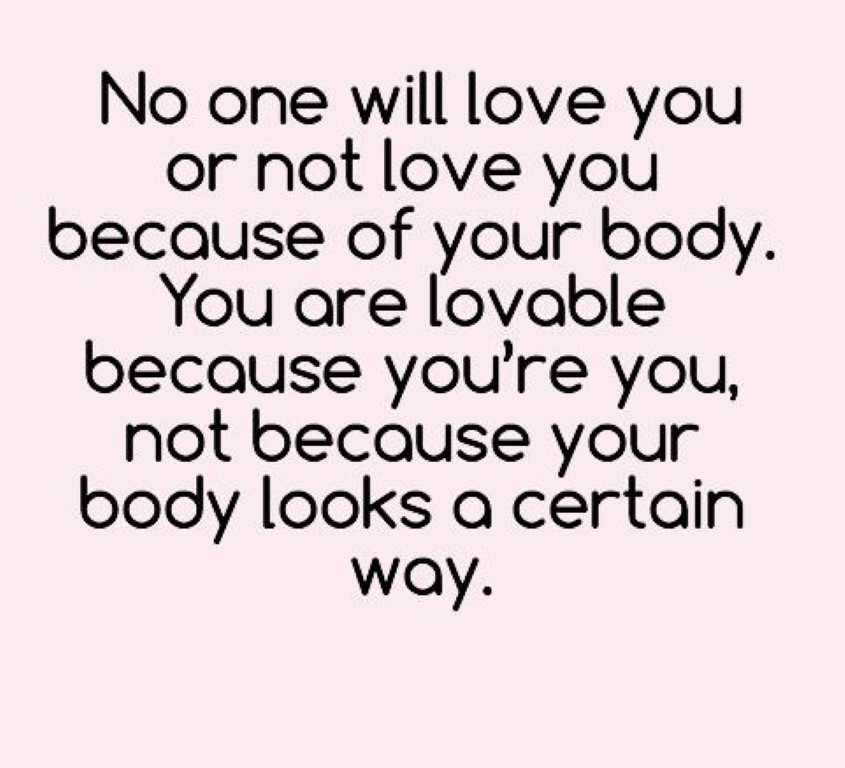
These were the stories that shaped my view of women’s bodies. There was little in the media I consumed to counteract it. You’re allowed to be ugly – that can be fixed with a makeover. You’re allowed to wear glasses – we’ll get you contacts. You’re allowed to wear braces – they’ll pay off in a while. Allowed to be fat? God, no. Heaven forbid.
The stories that I heard growing up, and the stories I was told as a child through movies, books, TV and other media were resoundingly devoid of positive, leading larger figures. The outcomes for larger people didn’t end well in the real life stories that I heard, and there just weren’t many larger people in the fictional stories.
Disney had a villain who was plus size – Ursula in the Little Mermaid – but certainly no leading roles. The implicit moral of the story that I took away = fat girls do not feature in stories that are worth telling. Here is an author trying to make the case for Disney characters being body positive – it is a stretch. (Incidentally, see here or here for some body positive films, there’s a few that I’m very keen to check out.)
There is silent disdain for larger people, women in particular. It was unconscionable to think that women might be happy being bigger, or that someone else might love her for that rather than despite that.
A full decade after this, I was running a 10km race, and following people much, much bigger than me, them happily jogging along; me struggling to haul my size 12 ass around the track. The full truth of ‘you can be fat and fit’ dawned on me, as I struggled to keep pace with a woman striding along, in her element, kicking ass.
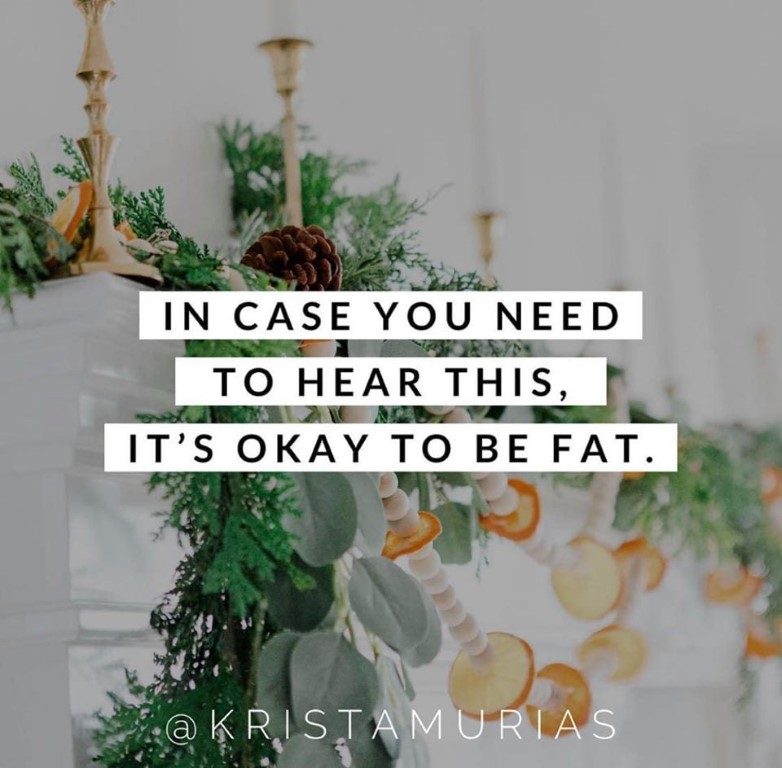
The following year, I was speaking to another student in my writing course, Carmen. ‘Oh yea, I run 10-15 km two or three times a week, but I don’t avoid treats, so hence I’m not as slim as I could be.’ That was a bombshell for me.
Guilt-free treats? Intentionally choosing to eat amazing food, regardless of how skinny or not that would make you? My mind was blown. This was an option? I could choose to enjoy food and not forever be guilt tripping myself into being a little skinnier than I was?
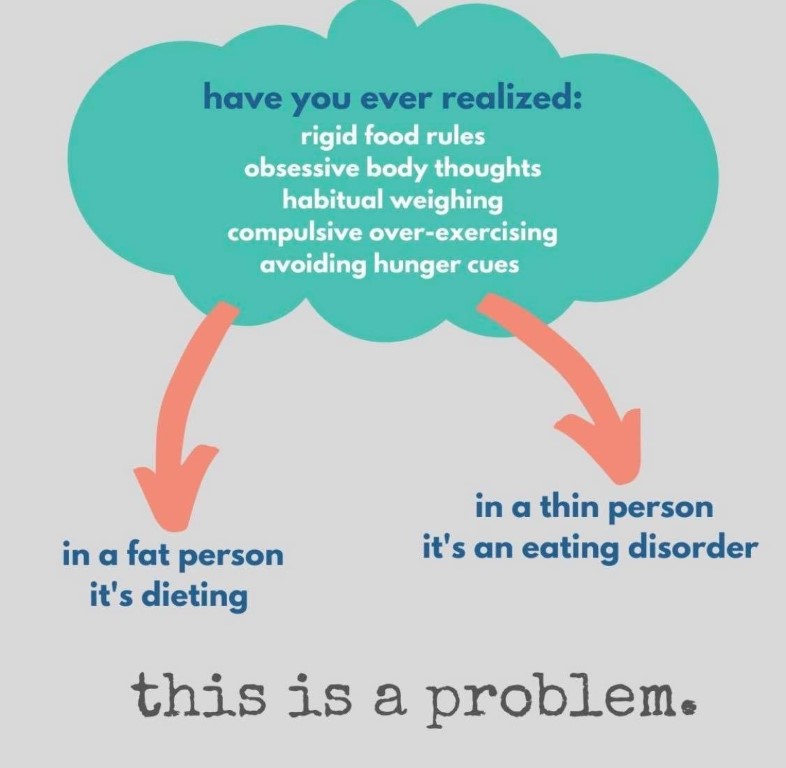
I guess I had basically already made the same choice, but the difference with mine was it came with a whole lot of baggage about how I wasn’t good enough, and how I was ‘less than’ or ‘unworthy’ because I couldn’t control my body to be super skinny, and people would obviously love me less – or not at all – for this.
Was it possible to make this choice and still be healthy? Was it possible to find an equilibrium where you stayed within a weight range and still got to eat delicious things? Most importantly, was it possible to still be loved by others and be a bit bigger?
It seemed like perhaps it was.
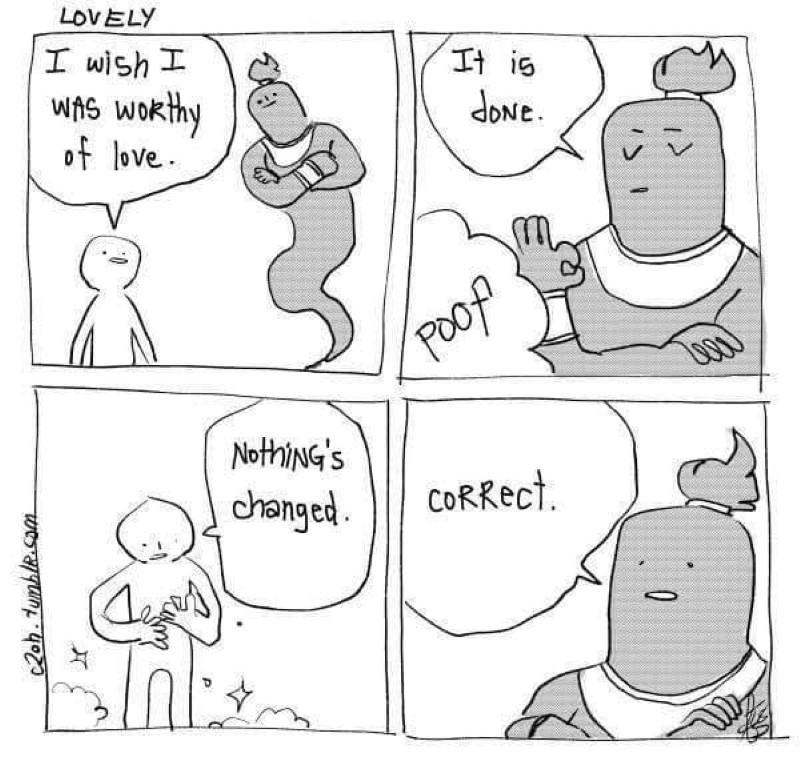
I cautiously gave myself permission to enjoy the foods I wanted… and quickly found myself a lot less guilt ridden, enjoying life – but quickly needing to buy bigger clothes.
The following summer, determined to get my Gold Duke of Edinburgh award. I trained hard, and completed the Queen Charlotte track in the Marlborough Sounds. If you don’t know it, it is one of NZ’s Great Walks, 75km of well-worn track along a hilly coastline and some of New Zealand’s most spectacular scenery. It is not particularly difficult terrain, but it is long, and in January, hot. We did it in 4 days, light days: 15km, hard day: 25km. Prior to this, I could count on one finger how many times I’d walked more than 20km in a day.

I had blisters everywhere, and I’d never been so exhausted in my life. Everything ached, but the act of keeping going (even after I had a little tantrum, sat down on the track, had a cry, and eventually realised that continuing was the only option) proved to myself with solid, concrete, undeniable evidence that I was strong, that I could do really hard things, and that I could overcome myself, doubt, fatigue, and pain, and accomplish anything I set my mind to.
Even now, whenever I’m faced with something that seems insurmountable, I will often hark back to that experience, and remind myself that I can conquer really hard challenges.
Fitness and fatness are very different things.
It is possible to be fat and healthy.
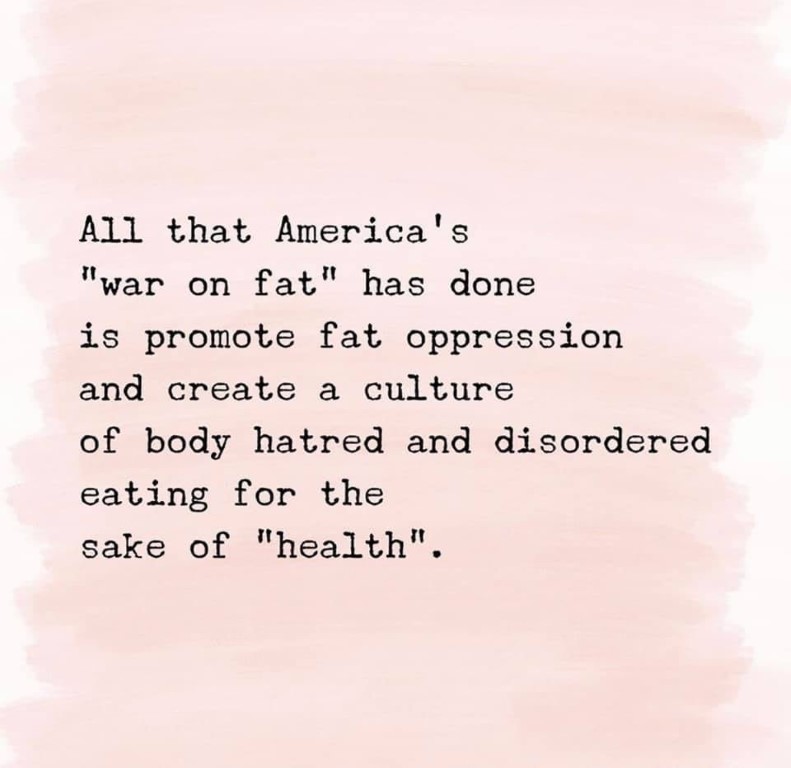
Fat and healthy is corroborated by research done on what doctors call the ‘Obesity paradox’. People with a bit of fat on them (BMI 25-30) actually fare better when diagnosed with heart disease than those in the ‘normal’ weight range, particularly in older patients. This study also explains that your fat is an organ that medical experts do not fully understand the benefits of just yet. Other studies show that being ‘Fat but fit’ significantly reduces risk factors for cardiovascular related death or disease.
This TED talk (Why dieting is pointless) I stumbled upon a few years ago articulately explains that diet, exercise, not smoking and drinking in moderation are the most significant determinants in whether or not someone has a risk of early death. Sandra Aamodt illustrates that weight has little bearing on health, if those four lifestyle habits are in place.
There aren’t explicit parameters put on exactly what is enough fruits and vegetables, how much, or how intense the exercise, or what constitutes moderate drinking, but the trend is clear – if you’re actually trying to lead a healthy lifestyle, the effort will pay off, regardless of your size. Weight loss in those scenarios might be a bonus, but the aim is a healthy lifestyle.
Let me say that again for the people in the back: You can be bigger, and be healthy.
You can have the same life expectancy and health outcomes as someone within a ‘healthy’ BMI, who has different lifestyle choices around exercise, how long you spend sitting (more dangerous for your health than obesity), smoking, consuming alcohol, stressing, resting, and your choice of diet and other lifestyle factors.
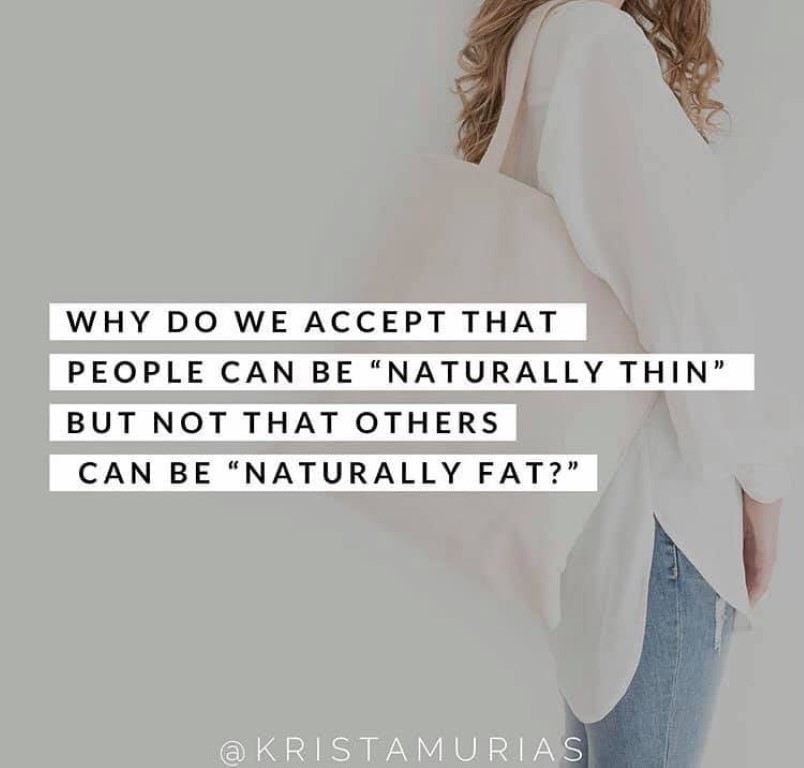
Certainly, it can be an ‘unhealthy lifestyle’ that leads to being a bit bigger than you’d like in the first place, but it’s not always. There are a host of factors that play into it. Genetics, age, predisposition, medication, illness, inability to exercise, psychological factors, amount of sleep, pregnancy/mothering in general, thyroid stuff, hormone stuff, job choice, as well as diet, exercise, alcohol consumption, and smoking.
It is in no way as simple as diet and exercise. Dispel that idea for yourself, and for how you evaluate others.
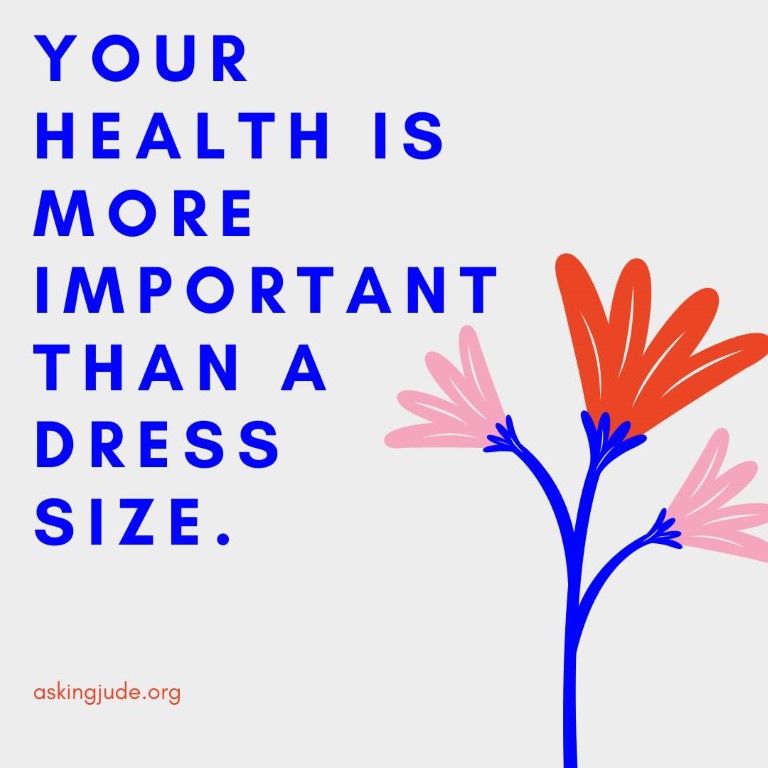
You can read more about this here, here, and here.
Next week, we look at the idea of getting ‘value for money’ out of food, and how scarcity mindset doesn’t really serve us.
Full disclosure: not all believe in the Obesity paradox; some question the legitimacy of the studies used to draw those conclusions.
A great read.
Loved this post. Particularly where you talked about having a tantrum on the track and ultimately realized the only solution was to continue, hahahaha. We can do hard things! Also agree with what you’ve said about how you can be fat and healthy. We’re quick to make assumptions but the reality is, we have no idea about other people’s lives (and their bodies).